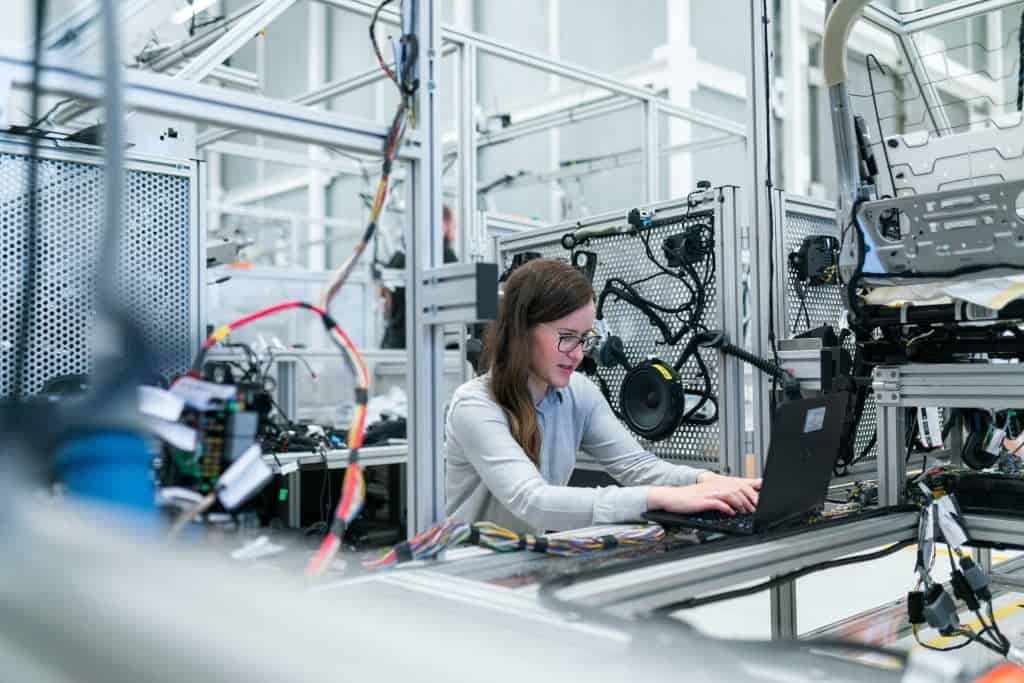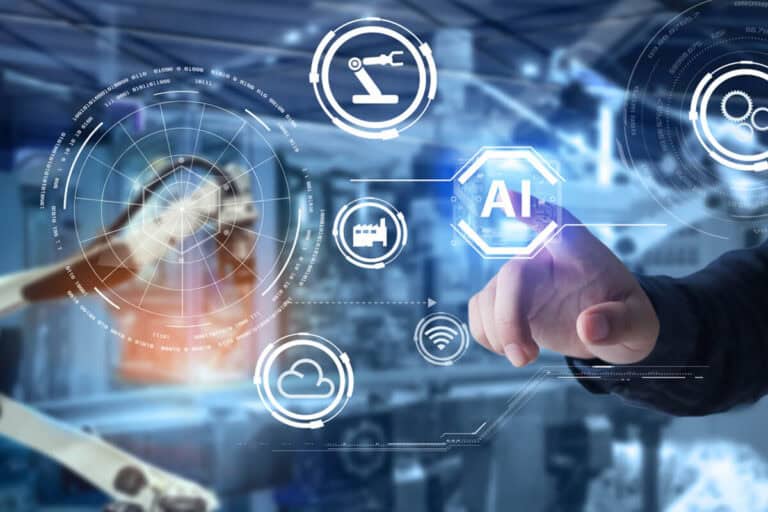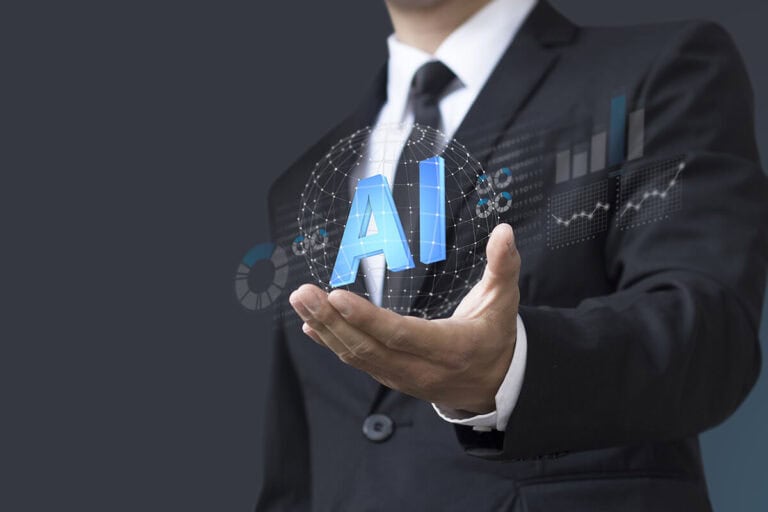“Produce better-quality products but at less operational cost and with efficiency” is a timeless goal for the manufacturing industry. The role and future of AI and ML in the manufacturing industry are promising. AI and ML can enable the manufacturing industry to scale their businesses and help them grow.
Table of Contents
ToggleThe “Smart Manufacturing” revolution is already making it easier for businesses to attain this objective than ever before.
According to many experts, artificial intelligence and machine learning are expected to affect factories and the manufacturing sector in the future significantly.
Artificial intelligence in the manufacturing market is valued at USD 2.3 billion in 2022 and is anticipated to be USD 16.3 billion by 2027, growing at a CAGR of 47.9% from 2022 to 2027.
Data has become a precious asset, and capturing and keeping it is becoming more accessible than ever, thanks to big data analytics.
Artificial intelligence and machine learning allow today’s manufacturers to enhance their bottom line significantly.
How? These technologies enable manufacturers to improve production efficiency by eliminating unnecessary production losses and associated costs.
Of course, getting tangible business value out of artificial intelligence is easier said than done. Artificial intelligence is a complex technology with varied industry applications.
So, how do manufacturers see through the “hype” and make a better decision to invest in industrial AI and gain a competitive edge?
We will help you understand precisely that in this article. There are many potential applications for AI and ML in the manufacturing industry. AI can come in handy for manufacturers for
- optimizing production processes
- improving quality control
- predicting maintenance needs
Machine learning can help manufacturers develop new materials or automate repetitive operational tasks.
Before exploring their applications and uses in the manufacturing industry, let’s learn about these technologies.
Is AI the same as ML?
This is the general query for many manufacturers that want to implement these technologies in their processes. So let’s get the same out of the way.
What is artificial intelligence?
Source: itchronicles.com
Artificial intelligence (AI) is a computer technology that simulates human cognitive functions such as learning and problem-solving. With AI, a computer program simulates how people think and make judgments to acquire new data and make decisions using mathematics and logic.
What is machine learning?
The term “machine learning” refers to AI in practice. The concept of machine learning is computer learning without being explicitly programmed. This allows a computer system to learn and improve on its own, based on past experiences.
What is the role of AI/ML in manufacturing?
Source: spd.group
Artificial Intelligence (AI) plays a vital role in the manufacturing industry. It’s closely linked to industrial IoT (IIoT) and leads to a 4.0 Industry. There are several applications for AI in manufacturing and a variety of ways that it might improve the business.
Machine learning (ML) is one of the most prevalent subsets of AI. Process manufacturing is highly competitive, with rapidly shifting markets and intricate systems with many moving parts. Process plants require all the benefits that AI and ML may provide to drive innovation and improve profitability.
In manufacturing, machine learning is widely used for predictive power analytics, robotics, predictive maintenance, and automated procedures that aid plant optimization, profitability, and safety.
Opportunities brought by AI/Ml to the manufacturing industry
However, despite these challenges, the future of AI and ML in the manufacturing industry is promising. These technologies can revolutionize manufacturing and the way items are produced.
Scaling is one of the most severe issues manufacturers face today. It might be tough to improve manufacturing without increasing prices using conventional approaches. This is where AI and ML can come in handy.
Businesses may boost their production by automating operations and procedures, which they can do without adding extra workers or investing in new equipment.
Businesses can make meaningful changes to their products, services, and operations by analyzing data and identifying trends. This step will help create better quality products or more efficient production processes. So yes, AI and ML can help businesses to save money and increase their profits.
Finally, AI and ML can also help businesses to manage their supply chains more effectively. By analyzing data on customer demand, manufacturers can better forecast future demand and plan their production accordingly.
Doing so will allow businesses to avoid the costly mistakes often occurring when demand is underestimated or overestimated.
Challenges of AI and ML in the manufacturing industry
Artificial intelligence (AI) and machine learning are already employed in various manufacturing environments.
However, several obstacles must be overcome before these technologies can be widely implemented in the manufacturing industry.
For example, AI and machine learning necessitate the availability of a large volume of data to train their algorithms. The data on the manufacturing process is frequently unavailable in a production setting. Furthermore, AI and ML algorithms often need to be customized for manufacturing.
Why should you care about artificial intelligence/machine learning in manufacturing plants?
AI integrates data, analyzes it, and generates deep insights and predictions that help organizations make better decisions across the board in plant-based processes.
Text analytics is an example of AI that utilizes large data sets to find patterns and trends, after which it creates models that predict what will happen in the future.
Automated plant management systems, such as PlantLink TM and PRISM TM, automate many time-consuming manual activities previously required. They allow plants to forecast changes in demand and supply, plan optimum maintenance windows, and detect early warning signs of problems.
For example, instead of storing data on a table or spreadsheet, biometric analytics can be used to train an AI model that can evaluate these data and make predictions about customer behavior.
Users’ behavioral patterns and physiological responses, such as heart rate and brain wave activity, may be captured through sensors built into clothing or attached to various parts of their bodies.
This information is helpful for monitoring changes in demand and supply, predicting optimal maintenance intervals, and detecting early warning signs of anomalies. With the help of AI and ML, manufacturing companies can:
- save money, discover new efficiencies and reduce resource wastage
- keep up with market developments and changes
- meet regulatory and industry standards, enhance safety, and minimize the environmental effects
- improve the quality of your goods
- discover and eliminate bottlenecks in the production process
- improve supply chain visibility and distribution networks
- discover failure or anomalies and take action sooner
- improve processes, and conduct more precise root cause analysis
- optimize equipment lifecycle
How to use AI/ML in manufacturing to the fullest extent?
Let’s get some detailed insight into the full extent of implementing AI/ML in manufacturing.
Improving data management
Before beginning an AI project or creating an ML model, you’ll need massive data to implement any AI or machine learning technology.
So, procurement of the necessary data set is essential.
You will also need to store the data set in a centralized location, make it accessible to your ML tools, and utilize the appropriate data handling platforms to transform raw data into usable datasets.
1. Defining your goals
There are several industrial applications for machine learning and AI, and each one has the potential to provide value and boost your bottom line.
Begin by narrowing down the areas that can deliver the most value quickly and presently possess enough data, then decide which objectives to aim for first to make AI/ML implementation easier.
2. Applying AI and ML to the entire organization
Although you may start by utilizing AI for particular, discrete chores in certain departments or applying ML predictions to specific use cases, you won’t see its full effect this way.
You must link every independent instance and apply AI automation and ML prediction capabilities vertically and horizontally throughout the company.
3. Assessing your available skills
You’ll need the appropriate people with the necessary skill sets to apply machine learning or AI to your company. This might include data scientists, IT experts, and other specialists.
4. Building a data-driven culture
To successfully implement AI/ML in the manufacturing sector, you must undergo a cultural change and become data-driven.
You must develop trust by gathering data to create valuable insights that assist workers in achieving their goals and fulfilling their daily tasks before you employ machine learning and AI algorithms. Otherwise, your employees will simply ignore them.
Conclusion
As you can see, there are many potential applications for AI and ML in the manufacturing industry.
These technologies can revolutionize manufacturing and the way items are produced.
However, there are still several challenges that must be overcome before they may be widely implemented.
Nevertheless, the future of AI and ML in the manufacturing industry is encouraging. Businesses need the right AI technology stack, tools, and a digital partner to help them seamlessly streamline the implementation process.





